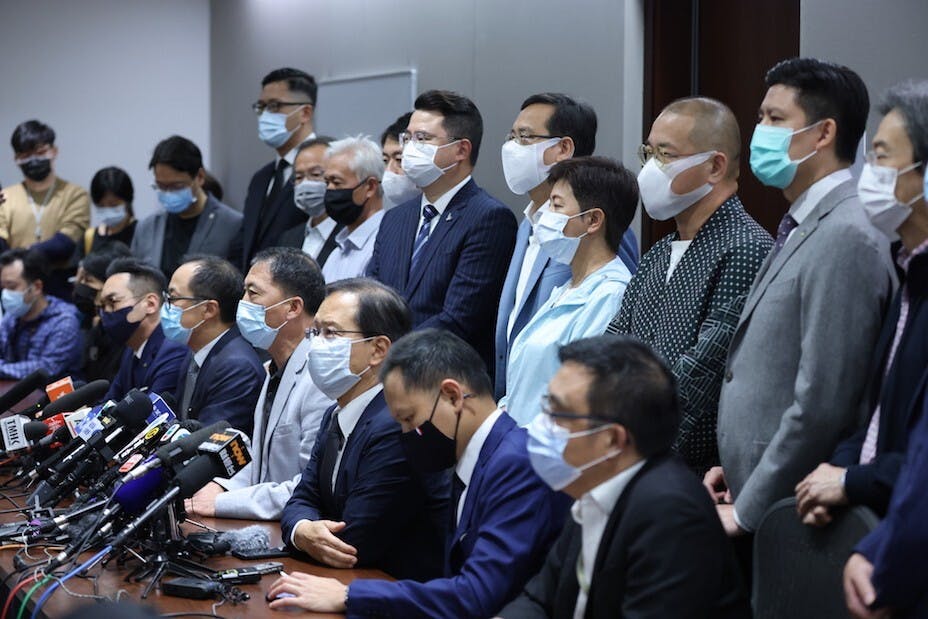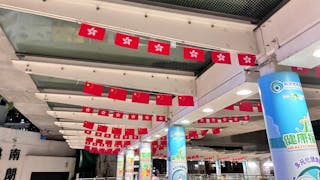全國人大常委會提出取消香港立法會議員資格的原則性決定,以及香港特區政府11月11日宣布4名立法會議員失去席位的後續行動,不僅對於定義愛國的標準,同時對於反對派未來的路向,都有重要的影響。
人大常委會的決定,說明立法會議員在下列情況下有可能失去議席:一、宣揚或支持「港獨」主張;二、拒絕承認國家對香港擁有並行使主權;三、尋求外國或者境外勢力干預香港特別行政區事務,以及行為不符合擁護《基本法》、效忠香港特別行政區的法定要求和條件。
4名的立法會議員的議席被褫奪後,15名泛民立法會議員宣布辭職,他們從11月12日起遞交辭職信。只有兩名泛民主派議員留任,包括熱血公民的鄭松泰和醫學界功能組別議員陳沛然。鄭松泰承諾未來會繼續為「同道中人」發聲;陳沛然則表示他會繼續留守在醫院及議會,跟同業和市民一起抗疫。
人大常委以法制的方式界定了愛國主義
最重要的是,人大常委以法制的方式界定了愛國主義。任何希望留在立法會或在未來的立法會選舉中參選的泛民人士,都必須遵守上述條件;此外,任何當選立法會議員的反對派人士都必須「莊嚴」和「真誠」宣誓。最後,如果香港的反對派人士希望以議員的身份進入立法會,他們別無選擇,只能成為「忠誠反對派」。他們駕輕就熟的拉布策略或必須非常謹慎及很少採用。
其次,可以預見,泛民陣營將變得嚴重碎片化。同時,一些有抱負的年輕民主派人士,要想成為立法會議員,或會在政治上變得溫和務實。
第三,泛民陣營中的一些人,未來幾個月可能組成新的政團甚至政黨。
第四,一些泛民人士可能感到氣餒而離開政治圈,部分泛民的支持者以至親泛民的選民,或會表現出政治冷感。一些中產階級甚至計劃移民,一些私營企業或會有不同程度的人才外流。如果分析正確,建制派將在下一屆立法會選舉贏得相對輕鬆,所佔的議席也會相對增加。
總而言之,愛國的標準已為人大常委會定義,現在的政治紅線比以往任何時候都清晰得多。如果香港特別行政區的反對派想進入立法會,他們將別無選擇,只能謙虛些、務實些,以及有策略地學習如何成為香港新政治的忠誠反對派。
Defining Patriotism in Hong Kong: Implications for Political Opposition
The move by the Standing Committee of the National People’s Congress (SCNPC) of the People’s Republic of China (PRC) to delineate the principles of disqualifying Hong Kong’s legislators, and the follow-up action by the Hong Kong government to announce the loss of the seats by four lawmakers on November 11, have significant implications for not only the criteria of patriotism but also the opposition’s future directions.
The SCNPC decision states that legislators can lose their seats if they (1) advocate or support “Hong Kong independence,” (2) refuse to recognize the fact that China possesses and exercises its sovereignty over the Hong Kong Special Administrative Region (HKSAR), (3) seek foreign or external forces to intervene in the HKSAR affairs, and (4) perform acts that do not conform to the requests and conditions of supporting the Basic Law and being loyal to the HKSAR.
These conditions are, according to the SCNPC decision, applicable to not only those legislators who were disqualified for participation in the Seventh Legislative Council (LegCo) elections originally scheduled to be held on September 6, 2020 (but later postponed due to Covid-19), but also those LegCo members who will participate in future elections. Most importantly, the HKSAR government can announce those legislators who lose the eligibility of being LegCo members.
The HKSAR government in the afternoon of November 11 announced that four legislators – Alvin Yeung, Dennis Kwok, Kwok Ka-ki and Kenneth Leung – could no longer stay in LegCo. Chief Executive Carrie Lam said in a press conference that “allowing them to stay in LegCo does not conform to political ethics,” that the HKSAR government had the responsibility of managing this matter, that the government requested that the SCNPC handled this matter in accordance with the law, and that Article 104 as interpreted by the SCNPC provided the legal basis.
In October 2016, after two legislators-elect, namely Baggio Leung and Yau Wai-ching, made provocative and inappropriate remarks during the oath-taking ceremony in LegCo, the HKSAR government initiated a judicial review to question the LegCo’s decision to allow the two to retake the oath. The High Court heard the review on November 3, but on November 7 the SCNPC took action to interpret Article 104 of the Basic Law, an interpretation that would have retroactive effects. The interpretation was that legislators-elect must take the oath “solemnly” and “sincerely.”
Chief Executive Carrie Lam added on November 11 that the SCNPC interpretation of Article 104 of the Basic Law was clear, meaning that legislators-elect must shoulder the legal responsibility of “violating” the oath. She said that currently there was no such action of violating the oath, but if there were legislators who had been disqualified to run in LegCo elections, then they were not eligible to become LegCo members. Otherwise, if they continued to be LegCo members, this would deviate from the SCNPC interpretation of Article 104. Lam remarked that if there were legislators disqualified to run in LegCo elections could still sit in the extended LegCo, this “looks illogical, self-contradictory and does not conform to political ethics.” As such, the HKSAR government had to request the SCNPC to solve this matter constitutionally.
After the four affected legislators were stripped of their LegCo seats, fifteen pan-democratic legislators resigned from LegCo and said they would submit their resignation letters on November 12. Only two democrats will remain in the extended LegCo, including Cheng Chung-tai of the localist group named Civic Passion and medical representative Pierre Chan Pui-yin, together with 41 other pro-government LegCo members. While Cheng remarked that he would continue to make his voice heard in the politically “limited” environment, Chan said that he would stay behind to fight Covid-19 along with the Hong Kong people and other legislators.
The political implications for the political opposition in the HKSAR are significant.
First and foremost, the SCNPC has defined patriotism in a legalistic way. If any democrat wishes to stay in LegCo, or runs in future LegCo elections, he or she will have to abide by the conditions laid out on November 11: namely (1) refraining from advocating or supporting anything deemed to be separatist, (2) recognizing the fact that China possesses and exercises its sovereignty over Hong Kong, (3) stopping any action to seek foreign or external forces to intervene in the HKSAR affairs, and (4) performing in a way deemed to be loyal to the HKSAR. Moreover, any pan-democratic activist elected to LegCo must take the oath of being legislators “solemnly” and “sincerely,” as the SCNPC interpretation of Article 104 in November 2016 stipulated. Finally, when four pan-democratic legislators were disqualified to run in the September 2020 LegCo elections, they were criticized for (1) “lobbying the US government to intervene in Hong Kong matters,” and (2) “vowing to indiscriminately veto the government’s proposals, appointments, and applications for funding support” in LegCo. While the pro-Beijing media have criticized the pan-democrats for their filibustering tactics in the LegCo, Chief Executive Carrie Lam clarified on November 11 that the four members’ disqualification from LegCo had nothing to do with filibustering. As such, if members of the political opposition in the HKSAR wish to participate in LegCo as lawmakers, they will have no choice but to be loyal oppositionists. Their traditional filibustering tactic may have to be exercised very cautiously and rarely because it can be deemed as undermining the executive-led nature of the HKSAR if the pan-democratic activists would return to LegCo in the future.
Second, it can be anticipated that the pan-democratic camp is going to be seriously fragmented. Even before the disqualification of four legislators on November 11, the pan-democratic camp had already been deeply divided. Eddie Chu Ho-dick and Raymond Chan Chi-chuen had decided to opt out of the LegCo in late September. While Chu believed that the extended LegCo would lack the voters’ mandate and “legitimacy,” Chan held the view that his term of office would end on September 30 during the cessation of the LegCo’s four-year term. With the benefit of hindsight, their principled position appeared to be more convincing than those pan-democrats who decided to join the extended LegCo. At least one of the pan-democratic legislators had said openly that he supported the participation of democrats in the extended LegCo on political and financial grounds, namely checking and balancing the power of pro-government legislators while simultaneously continuing to receive LegCo’s stipends to fight for the democracy movement. From now to the next LegCo elections, the pan-democratic camp will continue to be fragmented and be deprived of sufficient financial support, fighting an uphill battle to get elected or re-elected to LegCo. At the same time, some aspiring young democrats who want to become LegCo members will likely turn more politically moderate and pragmatic.
Third, due to the limited political space available to the pan-democrats, some of them may form a new group or party in the coming months, while the political realignment of the existing pan-democratic forces will perhaps be seen. On November 11, there were rumours that the Civic Party might be dissolved. No matter whether the Civic Party would persist, many moderate democrats were already disqualified to participate in LegCo elections. The Democratic Party still stands out as the moderate pan-democratic flagship, but the fragmented nature and complex motivations of different pan-democrats will perhaps necessitate self-critical thinking and brainstorming work for their future strategies, electoral platforms, and directions.
Fourth, some pan-democrats are so frustrated politically that they may leave the political scene. Some pan-democratic supporters, activists and even voters may be so politically alienated that political apathy, indifference and withdrawal would likely return to the political landscape of Hong Kong. Compounding the currently compressed political atmosphere is the looming wave of emigration. Many middle-class people are planning to emigrate, with some private-sector companies witnessing different degrees of brain drain. If this analysis is accurate, the HKSAR would likely witness a relatively easy victory and dominance of the pro-government forces in the next LegCo elections, especially if many pan-democrats are already seen as the political “undesirables” or “troublemakers” by some moderate and pragmatic voters.
On the other hand, with a crippled and self-destructive democratic forces, the extended LegCo would likely witness an easy passage of some government bills and policies, including a bill stipulating the need for all civil servants to uphold the national security law and the political criteria of patriotism, a bill on the Lantau Vision Tomorrow, and a possible bill allowing the Hong Kong people residing in the mainland to vote in LegCo elections. Because the LegCo is in lack of two-thirds of its members, it would be impossible to initiate any change in the method of selecting the next Chief Executive. As such, the next Chief Executive election will most likely continue with the previous method of having an Election Committee to select the Chief Executive.
Hence, with the benefit of hindsight, the pan-democrats perhaps made a blunder by not supporting a government proposal in 2015 on the reform of the Chief Executive elections. The reform blueprint stated that two to three candidates of the Chief Executive would be returned from a majority support of the Election Committee members and that eligible voters would vote for their Chief Executive through universal suffrage. The pan-democrats saw this blueprint as “pseudo-democratic,” while the pro-government forces embarrassed themselves by failing to turn up in LegCo to support the government bill. Now, the 2015 political reform blueprint is perhaps destined to be put on the backburner at least for several more years. Delayed political reform in the HKSAR is therefore attributable to profound political distrust, fierce struggles and political mistakes made by all sides of the stakeholders.
In conclusion, patriotism has been defined by the SCNPC interpretations of the Basic Law in November 2016 and November 2020, supplemented by how the executive-led government in the HKSAR disqualified some candidates running for the September 2020 LegCo elections. The political red line is now much clearer than ever before, although some democrats continue to criticize such line as remaining flexible and ambiguous. If the political opposition in the HKSAR wants to participate in the LegCo, its members will really have no choice but to learn humbly, pragmatically, and strategically how to become loyal oppositionists in the new politics of Hong Kong.
原刊於澳門新聞通訊社(MNA)網站,本社獲作者授權轉載。





































